Business
Dialog Axiata extends its support to the Sri Dalada Perahera for the 16th consecutive year

As a key contributor and advocator of the major cultural and religious festivals in the country, Dialog Axiata PLC, Sri Lanka’s premier connectivity provider, once again extended its support to the Kandy Esala Perahera (also known as the Sri Dalada Perahera or the Festival of the Tooth) which was held from August 2 – 12.
One of the oldest and most venerated religious festivals in Sri Lanka, the Sri Dalada Perahera is held in the month of Esala (July or August) to commemorate the first sermon of Lord Buddha after he attained enlightenment. A 10-day event, the Kandy Esala Perahera pays homage to the Sacred Tooth Relic and its four guardian deities, Gods Natha, Vishnu, Kataragama and Goddess Pattini. The procession appeals to the Gods, seeking their blessings for rains that will aid the cultivation of crops and the prosperity of the country.
While large crowds of spectators travelled from near and far to witness the procession, Dialog enabled its customers with the facility to watch the festival from the comfort of their homes by broadcasting it on Dialog Television.
In its efforts of preserving and promoting Sri Lanka’s heritage and culture, Dialog has been a long-term patron of a multitude of events across the country, contributing to the upliftment of Sri Lanka’s rich cultural history. This year will be the 16th consecutive year Dialog Axiata has extended its support to the historical Kandy Esala Festival and the procession of the Temple of the Sacred Tooth Relic of Kandy.
Business
Motorbike-sized tuna sold to Tokyo sushi restaurateurs for $1.3m
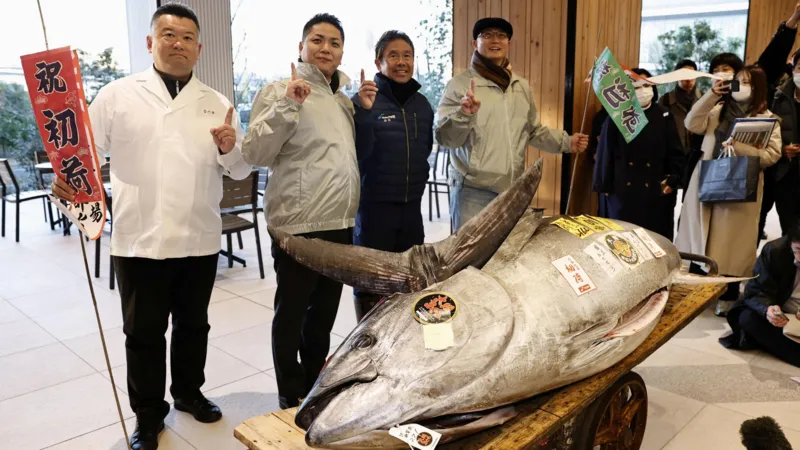
Sushi restaurateurs in Tokyo say they have paid 207m yen ($1.3m; £1m) for a bluefin tuna which is about the size and weight of a motorbike.
The sale is the second highest price ever paid at the annual new year auction at Toyosu Fish Market in the Japanese capital.
Onodera Group, which had the winning bid, said the tuna – which weighs in at 276kg (608lb) – would be served at its Michelin-starred Ginza Onodera restaurants, as well as Nadaman restaurants across the country.
“The first tuna is something meant to bring in good fortune,” Onodera official Shinji Nagao told reporters after the auction, news agency AFP reported.
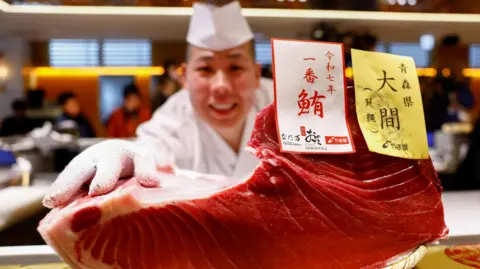
Mr Nagao added that he hoped people would eat the tuna – caught off the Aomori region in northern Japan – and “have a wonderful year”.
The group has paid the top price in the Ichiban Tuna auction for five years straight.
Last year, it forked out 114m yen for the top tuna.
The highest auction price since comparable records began in 1999 was 333.6m yen in 2019 for a 278kg bluefin.
It was paid by self styled Japanese ‘tuna King’ and sushi restaurant Kiyoshi Kimura.
Toyosu fish market, which opened in 1935, claims to be the biggest fish market in the world, and is known for pre-dawn daily tuna auctions.
But tuna was not the only catch on offer on Sunday, with Hokkaido sea urchins also fetching a record-breaking 7m yen according to the Japan Times.
[BBC]
Business
Sri Lanka’s trade deficit widens by US$ 833 million in the first 11 months of 2024

Sri Lanka’s earnings from exports increased in the first eleven months of 2024 while the import expenditure also increased in the same period, according to the Weekly Economic Indicators report of the Central Bank.
The report indicates that the export unit value declined along with the import unit value, but the former’s decline was steeper, thus hurting the terms of trade and widening the trade deficit.
The following are some excerpts from the report.
“Earnings from exports increased by 7.0 per cent (year-on-year) to US dollars 11,670 mn during the eleven months ending November 2024 as a result of increased earnings mainly from exports of petroleum products (104%), textiles and garments (3.9%), tea (8.8%), food, beverages and tobacco (20.0%), rubber products (8.9%), and coconut related products (21.3%), among others. Import expenditure increased by 10.4 per cent (year-on-year) to US dollars 16,917 mn during the eleven months ending November 2024, mainly due to higher imports of textiles and textile articles (18.6%), machinery and equipment (22.4%), chemical products (22.6%), and base metals (48.6%), among others.”
“Accordingly, the deficit in the trade account widened to US dollars 5,247 mn during the eleven months ending November 2024 from US dollars 4,414 mn in the corresponding period of 2023.”
“The export unit value index declined by 2.9 per cent, (year-on-year), in November 2024 mainly due to lower prices recorded in exports of industrial goods. The import unit value index in November 2024 declined by 1.0 per cent, (year-on-year), due to lower prices recorded in intermediate and investment goods. Accordingly, the terms of trade deteriorated by 1.9 per cent, (year-on-year) to 90.3 index points in November 2024.”
“On year-on-year basis, Colombo Consumer Price Index-based headline inflation remained in the negative territory for the fourth consecutive month, recording a deflation of 1.7 per cent in December 2024 compared to the deflation of 2.1 per cent in November 2024.”
“The Non-Food category recorded a deflation of 3.0 per cent, while Food category recorded an inflation of 0.8 per cent. Meanwhile, the CCPI based core inflation remained unchanged at 2.7 per cent in December 2024.”
“In November 2024, Purchasing Managers’ Index for Construction Industry, as reflected by the Total Activity Index, expanded on a month-on-month basis.”
“The total outstanding market liquidity was a surplus of Rs. 140.156 bn by 03rd January 2025, compared to a surplus of Rs. 148.272 bn by the end of the last week.”
“During the year up to 03rd January 2025, the Sri Lanka rupee depreciated against the US dollar by 0.2 per cent.”
“The net purchases by the CBSL from the domestic foreign exchange market amounted to US dollars 209.0 mn in December 2024.”
“The gross official reserves were provisionally estimated at US dollars 6,451mn as at end November 2024. This includes proceeds from the PBOC swap arrangement.”
Business
CCI calls for 16-point policy plan for growth of construction industry
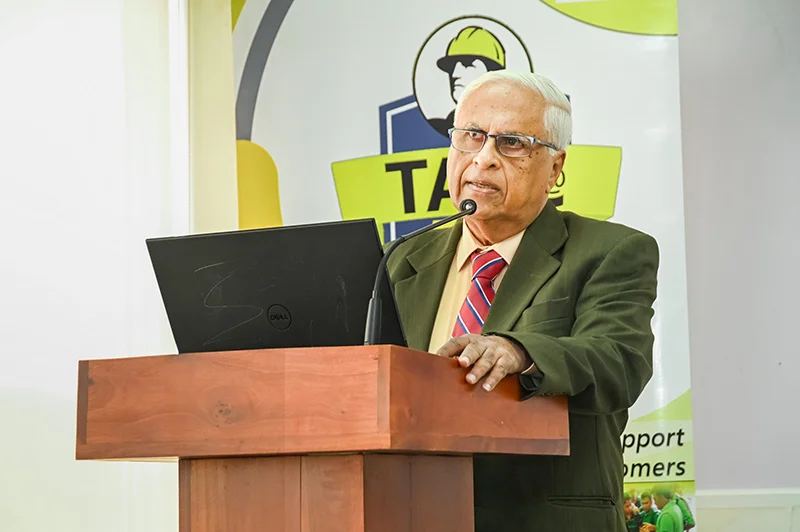
by Sanath Nanayakkare
Chamber of Construction Industry (CCI) of Sri Lanka Secretary General/CEO Eng. Nissanka N. Wijeratne points out that Sri Lanka construction industry in the first three quarters of 2024 recorded a growth of 14.2%, 15.5% and 23.8% respectively, and says that industry stakeholders are looking forward to brighter prospects in the Year 2025 and beyond.
“Growth numbers in the said period are a strong indication that we have overcome the recession the construction industry faced during 2020 – 2023. However, to place the country on a trajectory of rapid economic growth and to be able to service Sri Lanka’s foreign loans without further borrowings, the government has to take drastic policy measures, learning from the mistakes in the past. In that context, the following proposals related to the construction industry warrant the keen attention of the government and the policymakers. We kindly propose to the government to consider implementing the following measures and policies with the objective of uplifting the construction industry and transforming it to be a major contributor to the country’s economic growth”.
Projects above Rs. 200 million in value should commence only after undertaking a proper feasibility study. To ensure this a National Planning Commission (NPC) similar to that in India should be established and approval of the NPC should be mandatory for all projects exceeding Rs. 150 million.
Enacting a Public Procurement Law as recommended by the IMF. At present there are widespread violations of the Government Procurement Guidelines. Procurement should be only on competitive bids on BOQ’s based on completed designs and documentation, to ensure timely completion and to minimise cost overruns. There shall be no unsolicited proposals considered.
Procurement action should commence only if adequate funds have been allocated in the budget or secured.
Ensuring transparency in government procurement process, Procurement Committees on works contracts over Rs. 200 million shall have a senior professional nominated by the Chamber of Construction Industry of Sri Lanka, as an industry representative.
Enacting a Building and Construction Industry Security of Payment Act, similar to the law in Singapore.
Implementing the proposal of the Presidential Commission on Simplification of Laws and Existing Regulations to ensure the issue of development permits within 3 weeks by amending the UDA Act to establish a statutory committee with time limits for granting these permits. As a more effective solution, steps should be taken to introduce a fully online approval process within 12 months like in Singapore.
Establishing a development bank to promote innovations and development of projects. NDB and DFCC which were development banks earlier have now become commercial banks after privatising. It is often said that the development banks played a leading role in the growth of tiger economies in Asia.
Amending Arbitration Act to ensure that arbitration hearings and awards shall be concluded within 3 months from commencement similar to the practice in Singapore. Currently, this alternate dispute resolution mechanism takes a long period resembling normal court proceedings.
Adopting a Code of Ethics applicable to all stakeholders of the infrastructure and buildings development process. Already such a code has been developed by the Construction Industry Development Authority (CIDA) which can be adopted as a regulation.
Exempting housing and apartment developments from turnover taxes as such taxes will be an additional cost to the individual buyers of these units.
Introducing a housing loan scheme at a concessionary interest rate of 5% repayable over 40 years to the first-time home builders, similar to the two generations home loan schemes in Europe.
Promoting exportation of construction services by undertaking works contracts abroad whereby the government shall select 10 proven major contractors, in consultation with the Chamber of Construction Industry of Sri Lanka, and facilitate necessary bank guarantees in US$ for one contract each to these companies to undertake works contracts abroad. Each of these major companies shall award sub contracts to 2 local companies, so that through this process 30 local companies will venture out on overseas work.
Promoting the exportation of consultancy services by undertaking consultancy contracts abroad whereby the government shall select 15 proven consultancy firms registered with CIDA in consultation with the relevant professional institute and facilitate necessary bank guarantees and professional indemnity policies in US$ to these firms to undertake consultancy contracts abroad.
Harnessing the full potential of Sri Lanka’s graphite, rock phosphate and mineral sands deposits (in east coast and at Arawakkalu, Puttalam) with high-tech investments.
Enacting the amendments to Construction Industry Development Act, No.33 of 2014 and the regulations and rules thereunder including the Regulations for Contract Adjudication that were discussed at the National Advisory Council on Construction since 2016, without further delay.
Establishing a Standing Steering Committee on Construction (SSCC), chaired either by the President or the Secretary to the President, or a Senior Additional Secretary to the President to regularly monitor the development projects with the authority to give directions to solve any issues impeding progress. This SSCC shall have suitable representatives from the construction industry, appointed in consultation with the Chamber of Construction Industry of Sri Lanka and shall meet at least once every month.
In addition to that, he advocates for a number of policies to promote good governance and reduce corruption to attract more FDIs into the country. A summary of those proposals are as follows.
Changing the Executive Presidential system to Westminster type of governance. Changing the present PR system to a mixed system with the “first past the post” system, district PR and national PR, restricting the Cabinet to 25 members, CIABOC Commissioners to be appointed by the President on the recommendation of Constitutional Council, ethical dealing with any allegedly corrupt politicians, promoting a digital economy with all-round cashless transactions, taking action to recover allegedly ill-gotten assets and gains invested abroad through the Stolen Assets Recovery Initiative (StAR) implemented by the World Bank in collaboration with UN office on Drugs & Crime (UN ODC), and if necessary, introducing new laws.
-

 Features7 days ago
Features7 days agoThe recovery has begun
-

 Features6 days ago
Features6 days agoAKD faces challenging year ahead
-

 Editorial7 days ago
Editorial7 days agoBashing bureaucrats
-

 Editorial6 days ago
Editorial6 days agoA kiri-kekiri issue
-

 Sports6 days ago
Sports6 days agoSt. Sebastian’s dominate at Bambalapitiya
-
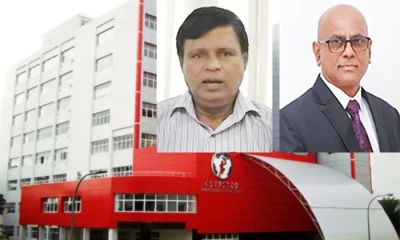
 News7 days ago
News7 days agoFM circular violated, Rs. 4 bn paid to CPC workers
-

 Features5 days ago
Features5 days agoThey, too, had a ball …Down Under
-
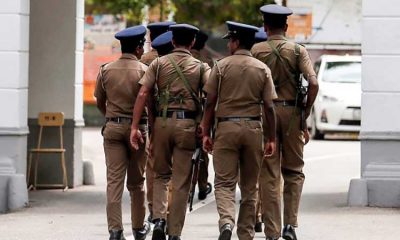
 News3 days ago
News3 days agoReshuffle of senior cops on the cards












